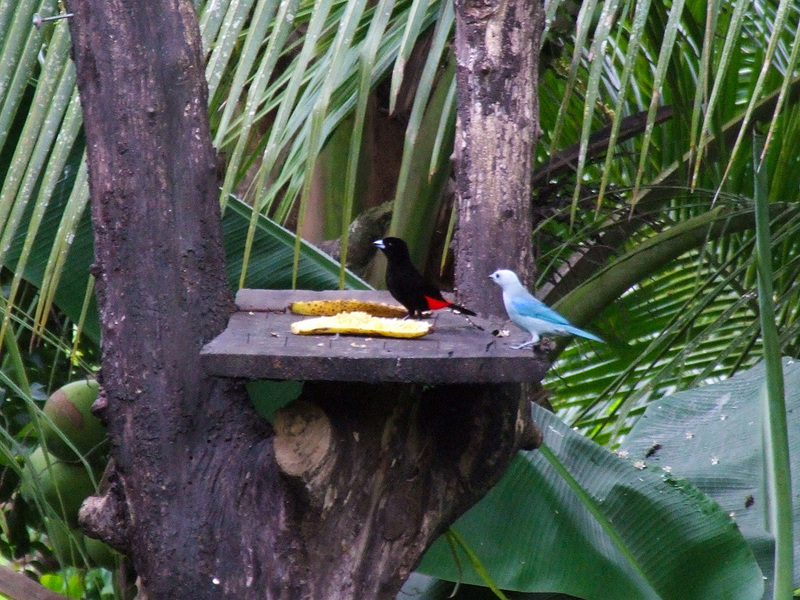|
| 질의: blue-gray tanager | 결과: 29번째/38 | |
Scarlet-rumped Cacique (Cacicus microrhyncus) - Wiki
| 제목: | Scarlet-rumped Cacique (Cacicus microrhyncus) - Wiki
| |

| 해상도: 1067x800
파일크기: 486216 Bytes
촬영일: 2007:03:24 08:58:46
사진기: FinePix S9500 (FUJIFILM)
F number: f/4.9
Exposure: 1/40 sec
Focal Length: 6670/100
등록시간: 2007:12:04 09:42:38
|
Scarlet-rumped Cacique
From Wikipedia, the free encyclopedia
Order: Passeriformes
Family: Icteridae
[Photo] In the garden of Gringo Pete's backpackers hostel. Typical birds. Beautiful! Blue-gray Tanager (Thraupis episcopus) and Scarlet-rumped Cacique (Cacicus microrhyncus). Source: Flickr (http://www.flickr.com/photos/shidachi/470432459/). Date: 2007-03-24. Author: http://www.flickr.com/photos/shidachi/
The Scarlet-rumped Cacique, Cacicus microrhyncus, is a passerine bird in the New World family Icteridae. It breeds from eastern Honduras to Panama and in the Pacific lowlands of South America from western Colombia south to Ecuador.
The Scarlet-rumped Cacique is a bird associated with humid lowland primary forest or old second growth woodland at up to 1000 m altitude. Unlike some caciques it is not usually a colonial breeder, but builds a bag-shaped nest 3.5-30 m high a tree, which usually also contains an active wasp nest. Each nest is 36-64 cm long and widens at the base, and is suspended from the end of a branch. The normal clutch is two dark-blotched white eggs. The male will assist in feeding the young, but does not incubate.
The male Scarlet-rumped Cacique is 23 cm long and weighs 68 g, and the female is 20 cm long and weighs 53 g. This cacique is a slim long-winged bird, with a relatively short tail, blue eyes, and a pale yellow pointed bill. It has mainly black plumage, apart from a scarlet patch on the lower back and upper rump. The female is smaller and a duller black than the male, and the juvenile bird has a brownish tone to the plumage and a brownish-orange rump.
The South American subspecies C. m. pacificus has a deeper bill and different vocalisations. Since there is no geographical overlap with the Central American nominate C. m. microrhyncus, it is possible that the southern form may be a separate species Pacific Cacique, C. pacificus, but there is at present insufficient data to justify the split.
The song of the male Scarlet-rumped Cacique is a pleasant wheee-whee-whee-whee-wheet, or, in pacificus, a descending melancholy wheeo-wheeo-wheeo-wheeo. The call is a burry pleeo; again pacificus differs, with a sweeter keeo or a shree.
The Scarlet-rumped Cacique feeds on large insects, spiders and small vertebrates, but will also take some fruit. It forages through the canopy in small flocks, often with Black-faced Grosbeaks or oropendolas. The noisy feeding flock may attract trogons or flycatchers.
http://en.wikipedia.org/wiki/Scarlet-rumped_Cacique
| The text in this page is based on the copyrighted Wikipedia article shown in above URL. It is used under the GNU Free Documentation License. You may redistribute it, verbatim or modified, providing that you comply with the terms of the GFDL. |
|
^o^
동물그림창고 똑똑전화 누리집
^o^
|
|

